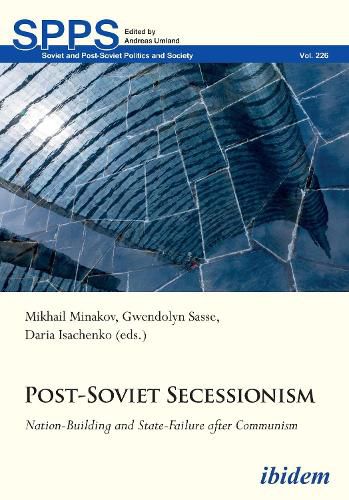Readings Newsletter
Become a Readings Member to make your shopping experience even easier.
Sign in or sign up for free!
You’re not far away from qualifying for FREE standard shipping within Australia
You’ve qualified for FREE standard shipping within Australia
The cart is loading…






The USSR’s dissolution resulted in the creation of not only fifteen recognized states but also of four non-recognized statelets: Nagorno-Karabakh, South Ossetia, Abkhazia, and Transnistria. Their polities comprise networks with state-like elements. Since the early 1990s, the four pseudo-states have been continously dependent on their sponsor countries (Russia, Armenia), and contesting the territorial integrity of their parental nation-states Azerbaijan, Georgia, and Moldova. In 2014, the outburst of Russia-backed separatism in Eastern Ukraine led to the creation of two more para-states, the Donetsk People’s Republic (DNR) and the Luhansk People’s Republic (LNR), whose leaders used the experience of older de facto states. In 2020, this growing network of de facto states counted an overall population of more than 4 million people.
The essays collected in this volume address such questions as: How do post-Soviet de facto states survive and continue to grow? Is there anything specific about the political ecology of Eastern Europe that provides secessionism with the possibility to launch state-making processes in spite of international sanctions and counteractions of their parental states? How do secessionist movements become embedded in wider networks of separatism in Eastern and Western Europe? What is the impact of secessionism and war on the parental states?
The contributors are Jan Claas Behrends, Petra Colmorgen, Bruno Coppieters, Nataliia Kasianenko, Alice Lackner, Mikhail Minakov, and Gwendolyn Sasse.
$9.00 standard shipping within Australia
FREE standard shipping within Australia for orders over $100.00
Express & International shipping calculated at checkout
The USSR’s dissolution resulted in the creation of not only fifteen recognized states but also of four non-recognized statelets: Nagorno-Karabakh, South Ossetia, Abkhazia, and Transnistria. Their polities comprise networks with state-like elements. Since the early 1990s, the four pseudo-states have been continously dependent on their sponsor countries (Russia, Armenia), and contesting the territorial integrity of their parental nation-states Azerbaijan, Georgia, and Moldova. In 2014, the outburst of Russia-backed separatism in Eastern Ukraine led to the creation of two more para-states, the Donetsk People’s Republic (DNR) and the Luhansk People’s Republic (LNR), whose leaders used the experience of older de facto states. In 2020, this growing network of de facto states counted an overall population of more than 4 million people.
The essays collected in this volume address such questions as: How do post-Soviet de facto states survive and continue to grow? Is there anything specific about the political ecology of Eastern Europe that provides secessionism with the possibility to launch state-making processes in spite of international sanctions and counteractions of their parental states? How do secessionist movements become embedded in wider networks of separatism in Eastern and Western Europe? What is the impact of secessionism and war on the parental states?
The contributors are Jan Claas Behrends, Petra Colmorgen, Bruno Coppieters, Nataliia Kasianenko, Alice Lackner, Mikhail Minakov, and Gwendolyn Sasse.